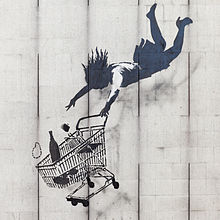Overconsumption, Consumerism, Advertising and Status

In 1955, economist Victor Lebow stated:
“Our enormously productive economy demands that we make consumption our way of life, that we convert the buying and use of goods into rituals, that we seek our spiritual satisfaction and our ego satisfaction in consumption. We need things consumed, burned up, worn out, replaced and discarded at an ever-increasing rate.”
Consumerism as cultural ideology
In the 21st century's globalized economy, consumerism has become a noticeable part of the culture. Critics of the phenomenon not only criticized it against what is environmentally sustainable, but also the spread of consumerism in cultural aspects. However, several scholars have written about the intersection of consumer culture and the environment. Discussions of the environmental implications of consumerist ideologies in work by economists Gustave Spethand, Naomi Klein, and consumer cultural historian Gary Cross. Leslie Sklair proposes the criticism through the idea of culture-ideology of consumerism in his works. He says that,
“First, capitalism entered a qualitatively new globalizing phase in the 1950s. As the electronic revolution got underway, significant changes began to occur in the productivity of capitalist factories, systems of extraction and processing of raw materials, product design, marketing and distribution of goods and services. […] Second, the technical and social relations that structured the mass media all over the world made it very easy for new consumerist lifestyles to become the dominant motif for these media, which became in time extraordinarily efficient vehicles for the broadcasting of the culture-ideology of consumerism globally. “
As of today, people are exposed to mass consumerism and product placement in the media or even in their daily lives. The line between information, entertainment, and promotion of products has been blurred so people are more reformulated into consumerist behaviour. Shopping centres are a representative example of a place where people are explicitly exposed to an environment that welcomes and encourages consumption as some of them are open for 24 hours. Goss says that the shopping center designers "strive to present an alternative rationale for the shopping centre's existence, manipulate shoppers' behavior through the configuration of space, and consciously design a symbolic landscape that provokes associative moods and dispositions in the shopper” On the prevalence of consumerism in daily life, Historian Gary Cross says that "The endless variation of clothing, travel, and entertainment provided opportunity for practically everyone to find a personal niche, no matter their race, age, gender or class."
The success of the consumerist cultural ideology can be witnessed all around the world. People rush to the mall to buy products and end up spending money with their credit cards, thus locking themselves into the financial system of capitalist globalization.
In an opinion segment of New Scientist magazine published in August 2009, reporter Andy Coghlan cited William Rees of the University of British Columbia and epidemiologist Warren Hern of the University of Colorado at Boulder saying that human beings, despite considering themselves civilized thinkers, are "subconsciously still driven by an impulse for survival, domination and expansion ... an impulse which now finds expression in the idea that inexorable economic growth is the answer to everything, and, given time, will redress all the world's existing inequalities." According to figures presented by Rees at the annual meeting of the Ecological Society of America, human society is in a "global overshoot", consuming 30% more material than is sustainable from the world's resources. Rees went on to state that at present, 85 countries are exceeding their domestic "bio-capacities", and compensate for their lack of local material by depleting the stocks of other countries, which have a material surplus due to their lower consumption.

Shop Until You Drop by Banksy, in London.
In many critical contexts, consumerism is used to describe the tendency of people to identify strongly with products or services they consume, especially those with commercial brand-names and perceived status-symbolism appeal, e.g. a luxury car, designer clothing, or expensive jewelry. Consumerism can take extreme forms – such that consumers sacrifice significant time and income not only to purchase but also to actively support a certain firm or brand. As stated by Gary Cross in his book "All Consuming Century: Why Consumerism Won in Modern America", he states "consumerism succeeded where other ideologies failed because it concretely expressed the cardinal political ideals of the century – liberty and democracy – and with relatively little self-distructive behavior or personal humiliation". He discusses how consumerism won in its forms of expression.
Opponents of consumerism argue that many luxuries and unnecessary consumer-products may act as a social mechanism allowing people to identify like-minded individuals through the display of similar products, again utilizing aspects of status-symbolism to judge socioeconomic status and social stratification. Some people believe relationships with a product or brand name are substitutes for healthy human relationships lacking in societies, and along with consumerism, create a cultural hegemony, and are part of a general process of social control in modern society.
Critics of consumerism often point out that consumerist societies are more prone to damage the environment, to contribute to global warming and to use up resources at a higher rate than other societies. Dr. Jorge Majfud says that "Trying to reduce environmental pollution without reducing consumerism is like combatting drug trafficking without reducing the drug addiction."
Another critic of Consumerism is James Gustave Speth. He argues that the growth imperative represents the main goal of capitalistic consumerism. In his book The Bridge at the Edge of the World he notes, "Basically, the economic system does not work when it comes to protecting environmental resources, and the political system does not work when it comes to correcting the economic system".
Adam Curtis, “The Century of the Self”
The Century of the Self is a 2002 British television documentary series by filmmaker Adam Curtis. It focuses on the work of psychoanalysts Sigmund Freud and Anna Freud, and PR consultant Edward Bernays. In episode one, Curtis says, "This series is about how those in power have used Freud's theories to try and control the dangerous crowd in an age of mass democracy."
The Century of the Self asks deeper questions about the roots and methods of consumerism and commodification and their implications. It also questions the modern way people see themselves, the attitudes to fashion, and superficiality.
The business and political worlds use psychological techniques to read, create and fulfill the desires of the public, and to make their products and speeches as pleasing as possible to consumers and voters. Curtis questions the intentions and origins of this relatively new approach to engaging the public.
Where once the political process was about engaging people's rational, conscious minds, as well as facilitating their needs as a group, Stuart Ewen, a historian of public relations, argues that politicians now appeal to primitive impulses that have little bearing on issues outside the narrow self-interests of a consumer society.
The words of Paul Mazur, a leading Wall Street banker working for Lehman Brothers in 1927, are cited: "We must shift America from a needs- to a desires-culture. People must be trained to desire, to want new things, even before the old have been entirely consumed. Man's desires must overshadow his needs."
The Century of the Self asks deeper questions about the roots and methods of consumerism and commodification and their implications. It also questions the modern way people see themselves, the attitudes to fashion, and superficiality.
The business and political worlds use psychological techniques to read, create and fulfill the desires of the public, and to make their products and speeches as pleasing as possible to consumers and voters. Curtis questions the intentions and origins of this relatively new approach to engaging the public.
Curtis ends by saying that, "Although we feel we are free, in reality, we—like the politicians—have become the slaves of our own desires,"



